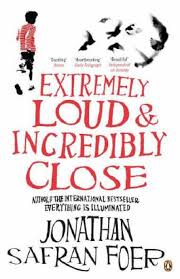 Jonathan Safran Foer
Jonathan Safran Foer
Houghton Mifflin Harcourt
|
I asked her, “Could we kiss a little bit?” “Excuse me?” she said, although, on the other hand, she didn’t pull her head back. “It’s just that I like you, and I think I can tell that you like me.” She said, “I don’t think that’s a good idea.” Disappointment #4. I asked why not. She said, “Because I’m forty-eight and you’re twelve.” “So?” “And I’m married.” “So?” … She said, “You’re a sweet, sweet boy.” I said, “Young man.” from Extremely Loud & Incredibly Close |
Story explores "getting over," making room for loss
The theme of Extremely Loud & Incredibly Close is loss, and the way loss can slowly eviscerate a life, leaving shells that people inhabit.
Oskar Schell (shell?) is nine years old, although he often adjusts his age and the truth to fit whatever situation he is in. Highly precocious, he possesses the intellect of an adult and the emotions of a child as he tries to make sense of a messy and complex world.
Oskar’s father perished in the World Trade Center attack on 9/11. As he attempts to come to grips with his loss, he finds in his father’s closet an envelope with “Black” written on it and a key inside. Believing that this key unlocks some secret about his father, Oskar sets out to find every person with the name Black in New York City. In his quest, he encounters others who are struggling with their own sense of loss and grief.
For such a grim subject, Foer, the author of Everything Is Illuminated, has some very funny scenes and dialogue (“My dad’s dead,” I told him. “Dead?” “He’s inanimate.”) Oskar’s voice is so rapid-fire and goes in so many directions at once that it can feel like you’ve been hijacked by a runaway mind with a kid at the controls.
Interspersed through the story are letters from Oskar’s grandmother and grandfather. As teenagers, they survived the firebombing of Dresden during World War II (“I had been on the stoop just half an hour before, now there was no stoop in front of no house on no street,” remembers his grandfather.) Both scarred by all they lost, they had immigrated separately to the United States, where they found each other and entered into a marriage of emotional convenience.
Through their letters they attempt to explain, and by explaining, to understand, how their lives have been defined by their losses. His grandfather writes, “Sometimes I can hear my bones straining under the weight of all of the lives I’m not living.” His grandmother writes, “I spent my life learning to feel less. Every day I felt less.”
The book seems to suggest that we don’t ever ‘get over’ our deepest losses. We simply make room for them and they become part of our lives, become part of the furnishings in that room of our soul that we never show to guests.
This review first appeared in The Columbia River Reader (February 15-March 14, 2012.) Reprinted with permission.

